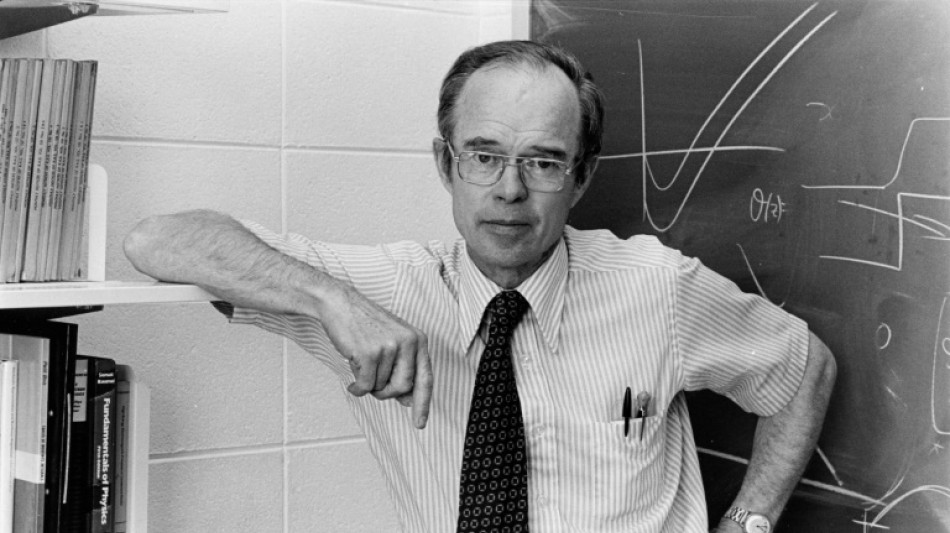
-
 Palestinians welcome ICC arrest warrants for Israeli officials
Palestinians welcome ICC arrest warrants for Israeli officials
-
Senegal ruling party wins parliamentary majority: provisional results

-
 Fiji's Loganimasi in for banned Radradra against Ireland
Fiji's Loganimasi in for banned Radradra against Ireland
-
New proposal awaited in Baku on climate finance deal

-
 Brazil police urge Bolsonaro's indictment for 2022 'coup' plot
Brazil police urge Bolsonaro's indictment for 2022 'coup' plot
-
NFL issues security alert to teams about home burglaries

-
 Common water disinfectant creates potentially toxic byproduct: study
Common water disinfectant creates potentially toxic byproduct: study
-
Chimps are upping their tool game, says study

-
 US actor Smollett's conviction for staged attack overturned
US actor Smollett's conviction for staged attack overturned
-
Fears rise of gender setbacks in global climate battle

-
 'World's best coach' Gatland 'won't leave Wales' - Howley
'World's best coach' Gatland 'won't leave Wales' - Howley
-
Indian PM Modi highlights interest in Guyana's oil

-
 Israel strikes kill 22 in Lebanon as Hezbollah targets south Israel
Israel strikes kill 22 in Lebanon as Hezbollah targets south Israel
-
Argentina lead Davis Cup holders Italy

-
 West Bank city buries three Palestinians killed in Israeli raids
West Bank city buries three Palestinians killed in Israeli raids
-
Fairuz, musical icon of war-torn Lebanon, turns 90

-
 Jones says Scotland need to beat Australia 'to be taken seriously'
Jones says Scotland need to beat Australia 'to be taken seriously'
-
Stock markets push higher but Ukraine tensions urge caution

-
 IMF sees 'limited' impact of floods on Spain GDP growth
IMF sees 'limited' impact of floods on Spain GDP growth
-
Fresh Iran censure looms large over UN nuclear meeting

-
 Volkswagen workers head towards strikes from December
Volkswagen workers head towards strikes from December
-
'More cautious' Dupont covers up in heavy Parisian snow before Argentina Test

-
 UK sanctions Angola's Isabel dos Santos in graft crackdown
UK sanctions Angola's Isabel dos Santos in graft crackdown
-
Sales of existing US homes rise in October

-
 Crunch time: What still needs to be hammered out at COP29?
Crunch time: What still needs to be hammered out at COP29?
-
Minister among 12 held over Serbia station collapse

-
 Spurs boss Postecoglou hails 'outstanding' Bentancur despite Son slur
Spurs boss Postecoglou hails 'outstanding' Bentancur despite Son slur
-
South Sudan rejects 'malicious' report on Kiir family businesses

-
 Kyiv claims 'crazy' Russia fired nuke-capable missile
Kyiv claims 'crazy' Russia fired nuke-capable missile
-
Australia defeat USA to reach Davis Cup semis

-
 Spain holds 1st talks with Palestinian govt since recognising state
Spain holds 1st talks with Palestinian govt since recognising state
-
Stock markets waver as Nvidia, Ukraine tensions urge caution

-
 Returning Vonn targets St Moritz World Cup races
Returning Vonn targets St Moritz World Cup races
-
Ramos nears PSG return as Sampaoli makes Rennes bow

-
 Farrell hands Prendergast first Ireland start for Fiji Test
Farrell hands Prendergast first Ireland start for Fiji Test
-
Gaza strikes kill dozens as ICC issues Netanyahu arrest warrant

-
 Famed Berlin theatre says cuts will sink it
Famed Berlin theatre says cuts will sink it
-
Stuttgart's Undav set to miss rest of year with hamstring injury

-
 Cane, Perenara to make All Blacks farewells against Italy
Cane, Perenara to make All Blacks farewells against Italy
-
Kenya scraps Adani deals as Ruto attempts to reset presidency

-
 French YouTuber takes on manga after conquering Everest
French YouTuber takes on manga after conquering Everest
-
Special reunion in store for France's Flament against 'hot-blooded' Argentina

-
 'World of Warcraft' still going strong as it celebrates 20 years
'World of Warcraft' still going strong as it celebrates 20 years
-
Fritz pulls USA level with Australia in Davis Cup quarters

-
 New Iran censure looms large over UN nuclear meeting
New Iran censure looms large over UN nuclear meeting
-
The first 'zoomed-in' image of a star outside our galaxy

-
 ICC issues arrest warrants for Netanyahu, Gallant, Deif
ICC issues arrest warrants for Netanyahu, Gallant, Deif
-
Minister among 11 held over Serbia station collapse

-
 Historic gold regalia returned to Ghana's king
Historic gold regalia returned to Ghana's king
-
Kyiv accuses Russia of launching intercontinental ballistic missile attack


'Visionary' US astrophysicist Eugene Parker dead at 94: NASA
Eugene Parker, a pioneering American astrophysicist who developed a mathematical model predicting the stream of charged particles from the Sun known as solar wind, has died aged 94, NASA said on Wednesday.
Parker, who in 2018 became the first person to witness the launch of a spacecraft bearing his name, was hailed as a visionary who laid the groundwork for the field of heliophysics, the science of understanding the Sun and its interactions with Earth and the solar system, including space weather.
"We were saddened to learn the news that one of the great scientific minds and leaders of our time has passed," said NASA Administrator Bill Nelson in a statement. Parker died Tuesday, according to the University of Chicago.
Born on June 10, 1927 in Michigan, Parker earned a bachelors degree in physics from Michigan State University and a PhD from Caltech, then taught at the University of Utah before settling at the University of Chicago, his longtime home, in 1955.
He began studying the temperature of the Sun's corona, and his calculations showed the conditions should produce a supersonic flow of particles off the surface.
The idea was initially met with skepticism -- even ridicule.
It only saw publication in the Astrophysical Journal when then editor and future Nobel prize winner Subrahmanyan Chandrasekhar realized he could not find a flaw in Parker's math, and overrode the objections of two reviewers.
The theory was proved correct in 1962 when NASA's Mariner II spacecraft encountered the stream of particles, called the solar wind.
Scientists now know that solar wind blankets all the planets, protecting them from harmful radiation, but also at times disrupting communications here on Earth when solar flares occur.
He also proposed the idea of "nanoflares" -- small solar explosions that occur all over the Sun -- which are responsible for the superheated corona, which was hotter than the surface, and couldn't be explained by known physics at the time.
Parker went on to study cosmic rays, the magnetic fields of galaxies and myriad other topics, and won numerous accolades including the US National Medal of Science, the Kyoto Prize, the Crafoord Prize and the American Physical Society Medal for Exceptional Achievement in Research.
"Anyone who knew Dr. Parker, knew that he was a visionary," said Nicola Fox, director of NASA's heliophysics division.
NASA's Parker Solar Probe, named after Parker, was launched in 2018, circling the Sun closer than any spacecraft had previously ventured.
It has already sent back troves of valuable data leading to new discoveries about space weather and the detection of a long theorized zone where the Sun's radiation vaporizes all cosmic dust.
C.Kovalenko--BTB

